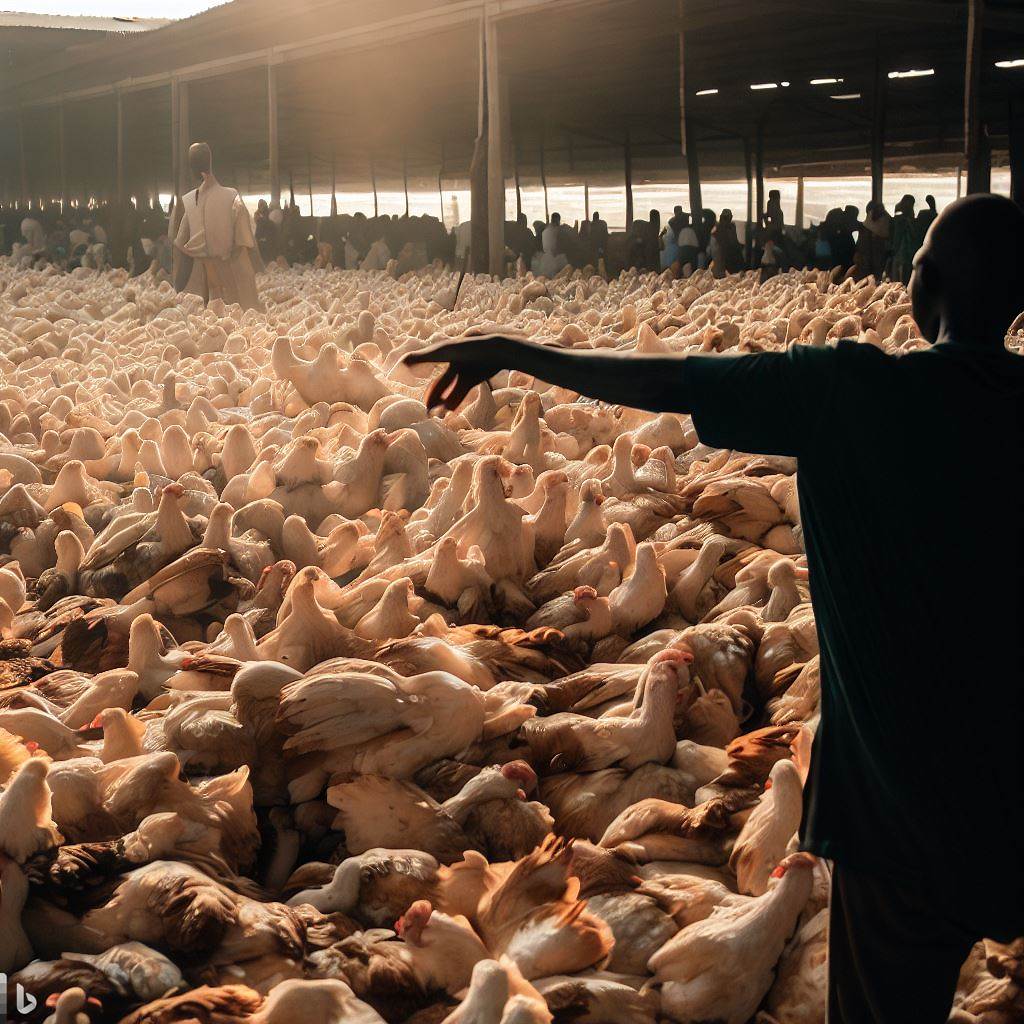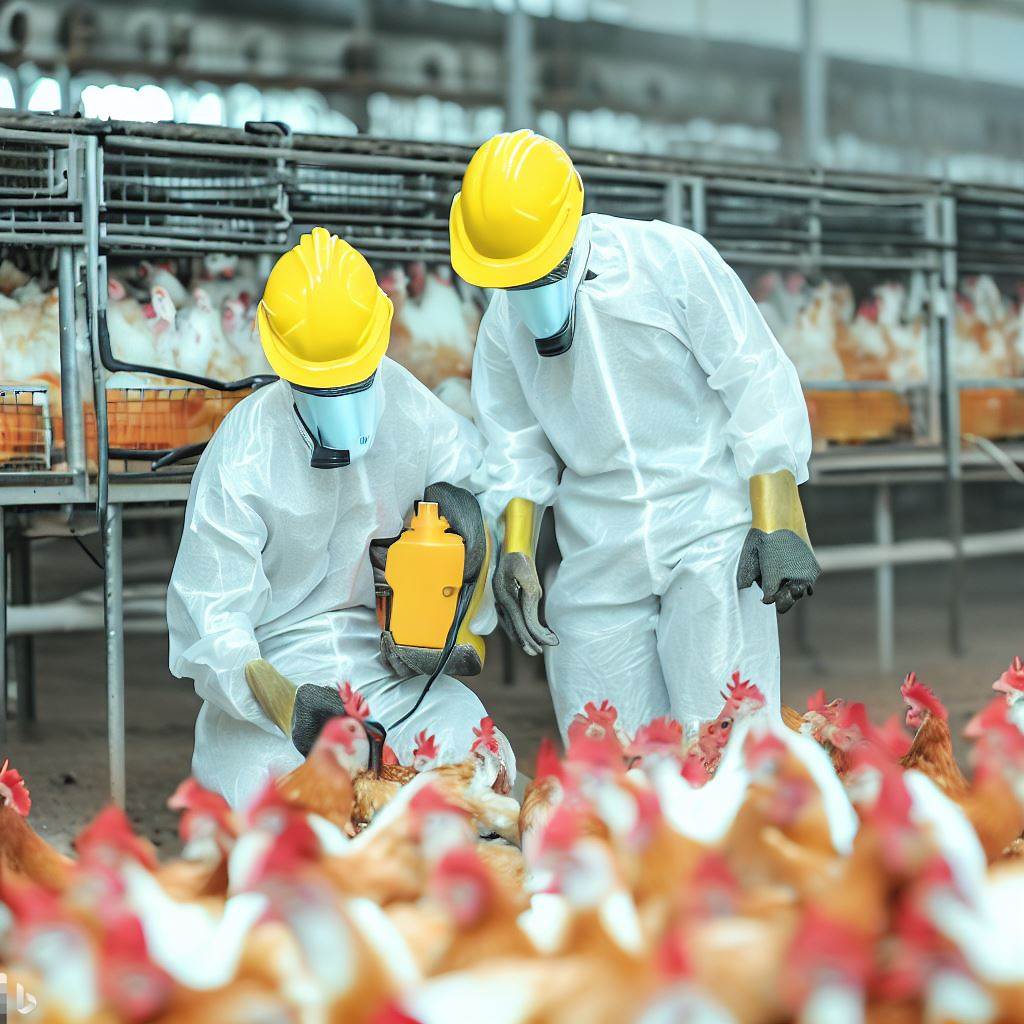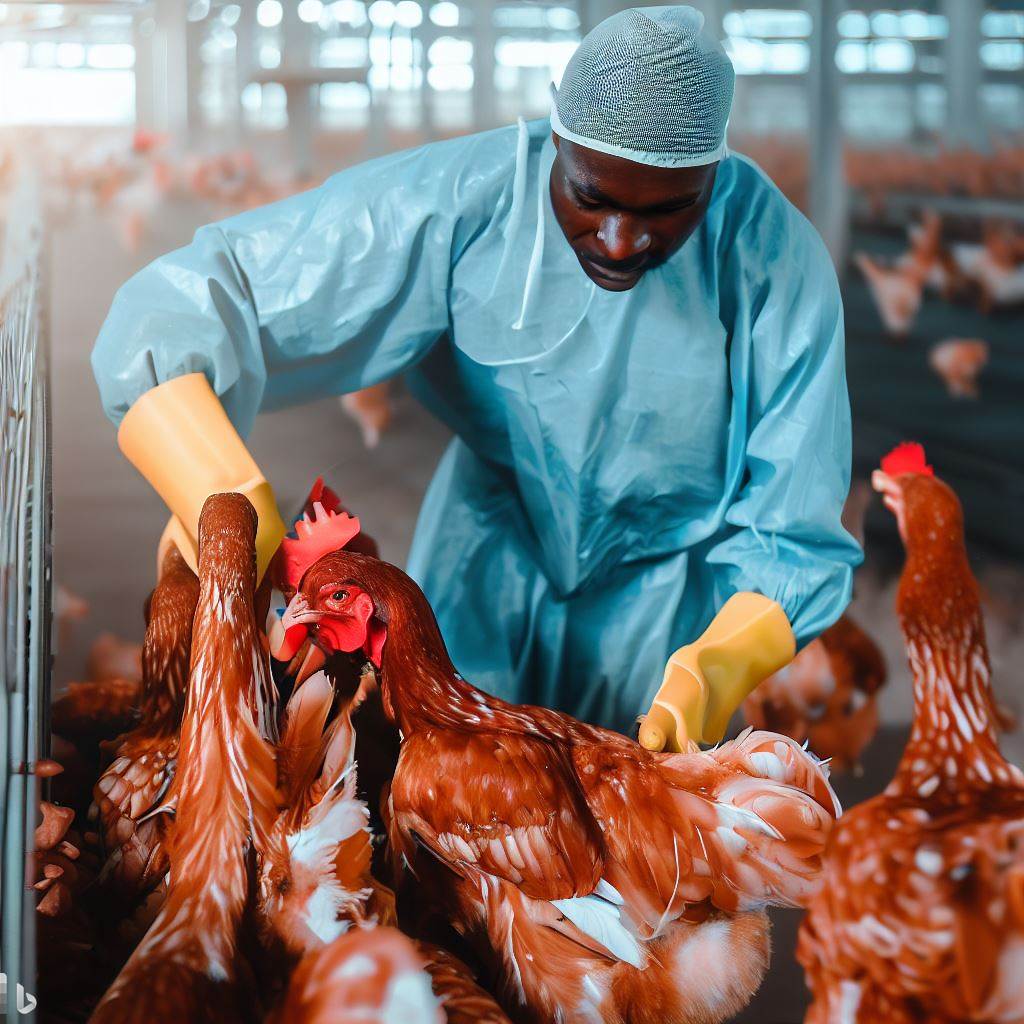Introduction
Poultry farming plays a crucial role in Nigeria’s agricultural sector, providing employment opportunities and contributing to the country’s food security.
With the potential for high profitability, poultry farming has become an attractive venture for farmers.
In Nigeria, poultry farming is an important source of income for many small-scale farmers and entrepreneurs.
The demand for poultry products, such as eggs and meat, continues to rise, driven by the country’s growing population and changing dietary preferences.
One of the main advantages of poultry farming is its potential for profitability.
With increasing demand, farmers can generate substantial income from selling eggs, meat, and other poultry products.
Additionally, poultry farming requires relatively low capital investment compared to other livestock farming ventures.
The profitability of poultry farming can be further enhanced by adopting modern techniques and best practices.
This includes utilizing advanced breeding methods to improve the productivity and quality of poultry birds.
Efficient feed management, disease control measures, and proper housing are also crucial for maximizing profitability.
Furthermore, the Nigerian government has implemented various initiatives to support poultry farmers, such as providing subsidies for inputs like feed and vaccines, as well as offering training programs to improve farmers’ skills and knowledge.
These interventions aim to boost productivity and profitability in the poultry sector.
In general, poultry farming is an important and profitable venture in Nigeria.
It not only provides income and employment opportunities but also contributes to addressing the country’s food security challenges.
With the right strategies and support, poultry farmers can capitalize on the growing demand and maximize their profits in this sector.
Starting a Poultry Farm in Nigeria
Starting a poultry farm in Nigeria requires careful consideration of various factors.
To ensure success, it is essential to make informed decisions regarding the location, breed selection, and infrastructure.
Selecting the right location is vital for the profitability of the poultry farm
An ideal location should have access to clean water, electricity, and transportation.
These amenities are necessary for the smooth functioning of the farm and the welfare of the poultry.
Additionally, proximity to markets and feed suppliers is crucial. Being closer to markets reduces transportation costs and allows for timely delivery of poultry products.
Similarly, being near feed suppliers ensures a continuous supply of feed, reducing the risk of shortages.
Choosing the right breed is another critical aspect of starting a poultry farm
In Nigeria, some popular and profitable poultry breeds include the Nigerian Indigenous Chicken, Broilers, and Layers.
When selecting a breed, it is important to consider various factors.
Egg production is essential for those focusing on egg farming, while meat quality and growth rate are crucial for meat production.
Additionally, disease resistance should be prioritized to minimize the risk of losses due to illness.
Building appropriate infrastructure and housing is necessary to provide a conducive environment for the poultry
Well-constructed poultry houses are essential for protecting the birds from predators and adverse weather conditions.
Adequate ventilation and lighting are crucial for maintaining optimal air quality and preventing the buildup of harmful gases.
The space requirements for each bird should also be considered to ensure they have enough room to move and behave naturally.
Additionally, proper waste management and sanitation systems are necessary to maintain a clean and healthy environment for the poultry.
By carefully considering these factors and making informed decisions, poultry farmers in Nigeria can set themselves up for success.
A suitable location with access to necessary amenities and proximity to markets and feed suppliers can significantly impact profitability.
Choosing the right breed based on factors like egg production, meat quality, and disease resistance can ensure productivity and minimize losses.
Lastly, building appropriate infrastructure and housing, including ventilation, lighting, and space requirements, will contribute to the well-being and performance of the poultry.
Read: Effective Strategies for Poultry Production in Nigeria
Managing Poultry Farm Operations
Managing a poultry farm involves various essential operations that contribute to its profitability and success.
In this section, we will explore key aspects such as sourcing quality day-old chicks, implementing proper nutrition and feeding techniques, and disease prevention and health management.
Sourcing quality day-old chicks
- Choosing reliable sources for acquiring healthy and productive day-old chicks is crucial.
- Look for established hatcheries or reputable suppliers to ensure the quality and genetic potential of the chicks.
- Perform thorough research, check customer reviews, and seek recommendations from experienced poultry farmers.
- Visiting the hatchery or supplier before purchasing can provide valuable insights into their operations and hygiene practices.
- It’s important to select chicks that come from parent stock with desirable traits such as high egg production and disease resistance.
- Ensure the chicks are properly vaccinated, debeaked, and have been handled with care during transportation.
- Quarantine newly arrived chicks to prevent the introduction of diseases to existing flocks.
Implementing proper nutrition and feeding techniques
- Poultry requires a well-balanced diet to support growth, reproduction, and overall performance.
- Consult with a poultry nutritionist to formulate appropriate diets that meet the specific requirements of the birds.
- Include a mix of grains, protein sources, minerals, and vitamins to ensure optimal nutrition.
- Consider incorporating locally available feed ingredients to reduce costs and promote sustainability.
- Proper feeding techniques, such as providing adequate feeding space and avoiding overfeeding, are essential to prevent wastage and health issues.
- Regularly monitor feed consumption and adjust diets based on the birds’ needs and growth stages.
Disease prevention and health management
- Nigeria faces various poultry diseases, including Newcastle disease, avian influenza, and coccidiosis.
- Implement strict biosecurity measures, such as restricting farm access, disinfecting equipment, and controlling visitors and vehicle movement.
- Regularly clean and disinfect the poultry house, equipment, and water sources to minimize disease transmission.
- Ensure proper ventilation and temperature control in the poultry house to prevent stress and reduce disease susceptibility.
- Administer vaccines at the recommended ages and follow the vaccination schedule.
- Consult with a veterinarian to develop a comprehensive health management plan and schedule regular check-ups.
- Early detection of disease symptoms and prompt treatment can significantly reduce mortality and financial losses.
By effectively managing the operations of a poultry farm, such as sourcing quality day-old chicks, implementing proper nutrition and feeding techniques, and prioritizing disease prevention and health management, farmers can enhance the profitability and sustainability of their poultry ventures.
Read: The Role of Technology in Nigeria’s Poultry Industry

Discover More: Health and Safety Standards in Nigeria’s Poultry Industry
Uncover the Details: The Rise of Agri-tech Jobs in Nigeria’s Economy
Maximizing Profitability in Poultry Farming
Efficient production management
- Implement effective flock management strategies and maintain detailed record-keeping.
- Monitor feed conversion rates, mortality rates, and daily weight gain to optimize production efficiency.
Marketing and sales strategies
- Explore different marketing channels for poultry products in Nigeria to reach a wider customer base.
- Emphasize the importance of quality packaging, branding, and building strong customer relationships.
Exploring value-added opportunities
- Consider diversification through product processing and packaging to tap into new market segments.
- Highlight the benefits of value addition, such as increased profitability and higher customer demand.
Read: A Day in the Life of a Nigerian Poultry Farmer
Overcoming Challenges in Poultry Farming
Dealing with market fluctuations and competition
- Develop strategies to evaluate market trends and adapt to price changes in the poultry industry.
- Emphasize the significance of conducting market research to identify consumer demands and stay ahead of competitors.
- Build strong relationships with reliable suppliers and loyal customers to ensure a steady market for your poultry products.
Managing poultry diseases and biosecurity
- Familiarize yourself with common poultry diseases and their symptoms to prevent outbreaks and mitigate potential losses.
- Implement effective biosecurity measures, such as strict sanitation practices and restricting farm access, to minimize disease spread.
- Regularly monitor the health of your flock, and promptly isolate and treat any sick birds to prevent the spread of infections.
- Establish a vaccination schedule and adhere to it to protect your poultry from vaccine-preventable diseases.
- Take a proactive approach to disease management by regularly consulting with veterinarians and staying updated on industry best practices.
Poultry farming in Nigeria, like any agricultural venture, comes with its fair share of challenges.
However, by addressing these challenges head-on, poultry farmers can overcome them and build profitable businesses.
Two significant obstacles faced in poultry farming are market fluctuations and competition, along with poultry diseases and the need for biosecurity measures.
Dealing with market fluctuations and competition
1. Evaluating market trends and adapting to price changes
To survive in the ever-changing market, poultry farmers must stay updated on the latest market trends and adapt their pricing strategies accordingly.
This includes evaluating demand and supply dynamics, predicting market fluctuation patterns, and adjusting prices to remain competitive while maintaining profitability.
2. Importance of market research and building relationships
Conducting thorough market research is crucial for understanding consumer preferences, identifying potential niches, and anticipating market shifts.
By knowing your target customers’ demands and preferences, you can tailor your products to meet their needs.
Additionally, developing strong relationships with suppliers and customers fosters trust and loyalty, ensuring a consistent supply of quality inputs and a stable market for your poultry products.
Managing poultry diseases and biosecurity
1. Common poultry diseases and effective biosecurity measures
Poultry diseases can cause significant losses if not properly managed.
Familiarizing yourself with common diseases, such as avian influenza, Newcastle disease, and coccidiosis, enables early detection and swift action.
Implementing biosecurity measures, such as rigorous sanitation practices, controlled farm access, and pest control, help prevent disease transmission and maintain a healthy flock.
2. Importance of regular monitoring and proactive disease management
Regularly monitoring your flock’s health is essential for early disease detection and prevention.
Promptly isolating any sick birds and seeking veterinary advice for appropriate treatment minimizes the spread of infections.
Vaccinations, personalized to your farm’s specific needs, offer additional protection against prevalent diseases.
Proactivity is vital, and staying informed about emerging diseases, industry best practices, and new vaccination protocols is crucial for effective disease management.
By addressing the challenges of market fluctuations and competition, as well as poultry diseases and biosecurity, poultry farmers in Nigeria can thrive in their businesses.
Establishing a strong market presence, adapting to changing market dynamics, and implementing robust disease prevention and management strategies will undoubtedly contribute to profitable poultry farming.
Read: Sustainable Practices for Poultry Producers in Nigeria
Conclusion
Throughout this blog post, we have discussed several insider tips for profitable poultry farming in Nigeria.
We have highlighted the importance of proper planning, choosing the right breed, and implementing effective management practices.
Additionally, we have emphasized the potential for significant profits in the Nigerian poultry farming industry.
With the population growth and increasing demand for poultry products, the market offers promising opportunities for aspiring farmers.
We strongly encourage our readers to consider starting or expanding their poultry farming ventures.
By applying the insider tips and strategies provided, success in the industry can become achievable.
Remember the significance of creating a comprehensive business plan, seeking professional guidance, and investing in high-quality infrastructure.
Adopting modern techniques and prioritizing biosecurity measures will also contribute to the growth and profitability of your poultry farm.
With dedication, hard work, and the right knowledge, you can thrive in the Nigerian poultry farming landscape.
So why wait? Take the leap and embark on a rewarding journey in the thriving poultry industry of Nigeria!
Here’s to your success in profitable poultry farming!




